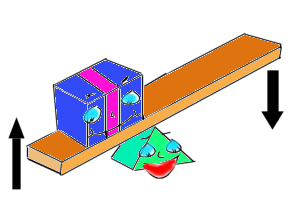Machines
are things that make our daily lives easier for us. Without these machines,
many tasks would become either difficult or totally impossible. They have few or
no moving parts. These machines use energy to work.
A simple machine is any device that helps us to perform our work more easily when a force is applied on it. A screw, wheelbarrow and a bottle opener are simple machines. To make any of these simple machines do work for us, we need to apply a force on it.
There are many ways that simple machines can help us. It allows us to use a smaller force to overcome a larger force. It can also help us change the direction of the force and work with a faster speed.
A simple machine is any device that helps us to perform our work more easily when a force is applied on it. A screw, wheelbarrow and a bottle opener are simple machines. To make any of these simple machines do work for us, we need to apply a force on it.
There are many ways that simple machines can help us. It allows us to use a smaller force to overcome a larger force. It can also help us change the direction of the force and work with a faster speed.
A pulley is a simple machine
A lever is a simple machine
A screw is a simple machine
The Simple Machine song
Vocabulary
A screw is a simple machine
The Simple Machine song
Compound
Machine: Two
or more simple machines working together to make work easier.
Examples: Wheelbarrow,
Can Opener, Bicycle.
Distance A machine can make work easier in
three ways: Any change in the size of the force changes the distance (see
force). No machine can increase both force and distance.
Force: You are doing work when you use a
force to cause motion. Machines make work easier, but they need energy to do
work. A person is usually the source of energy for a simple machine. A person
uses a force to operate a simple machine. A force is a push or pull. The force
applied to to the machine is called work input or effort force.
Gears: A gear sometimes is viewed
as a simple machine, but it is really just a wheel with teeth. Two toothed
wheels fit together either directly or through a chain or belt so one wheel
will turn the other. Some gears may have a screw or a toothed shaft in place of
one of the wheels. A gear may also be a combination of toothed wheels that
produces a certain speed (such as a bicycle's top gear which makes the bike go
fast, and the low gear for slow speed.)
Examples: Clock, Automobile, Drill.
Inclined
plane: A sloping surface, such as
a ramp. An inclined plane can be used to alter the effort and distance involved
in doing work, such as lifting loads. The trade-off is that an object must be
moved a longer distance than if it was lifted straight up, but less force is
needed.
Examples: Staircase, Ramp, Bottom of a Bath
Lever: A straight rod or board
that pivots on a point known as a fulcrum. The fulcrum can be moved depending
on the weight of the object to be lifted or the force you wish to exert. Pushing
down on one end of a lever results in the upward motion of the opposite end of
the fulcrum.
Examples: Door on Hinges, Seesaw, Hammer, Bottle Opener.
Pulley: A wheel that usually has a groove
around the outside edge. This groove is for a rope or belt to move around the
pulley. Pulling down on the rope can lift an object attached to the rope. Work
is made easier because pulling down on the rope is made easier due to gravity.
Examples: Flag Pole, Crane, Mini-Blinds.
Screw: An inclined plane wrapped around a
shaft or cylinder. This inclined plane allows the screw to move itself or to
move an object or material surrounding it when rotated.
Examples: Bolt, Spiral Staircase.
Simple
Machine: Simple machines are
"simple" because most have only one moving part. Some are so simple,
they don't have any moving parts! Simple
machines make work easier.
Examples: Screw, Wheel and Axle, Wedge, Pulley, Inclined Plane, Lever.
Wedge: Two inclined planes joined back to
back. Wedges are used to split things.
Examples: Axe, Zipper, Knife.
Wheel and Axle: A wheel and axle has a larger wheel (or wheels) connected by a smaller cylinder (axle) and is fastened to the wheel so that they turn together. When the axle is turned, the wheel moves a greater distance than the axle, but less force is needed to move it. The axle moves a shorter distance, but it takes greater force to move it.
Wheel and Axle: A wheel and axle has a larger wheel (or wheels) connected by a smaller cylinder (axle) and is fastened to the wheel so that they turn together. When the axle is turned, the wheel moves a greater distance than the axle, but less force is needed to move it. The axle moves a shorter distance, but it takes greater force to move it.
Examples: Door Knob, Wagon, Toy Car.
Work: You are doing work when you use a force to cause motion. To measure the amount of work you do, multiply the force times the distance the object moved.
Work: You are doing work when you use a force to cause motion. To measure the amount of work you do, multiply the force times the distance the object moved.

